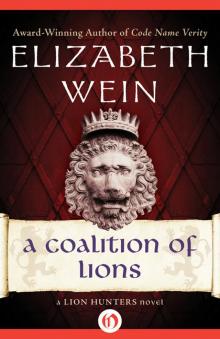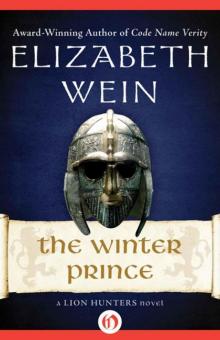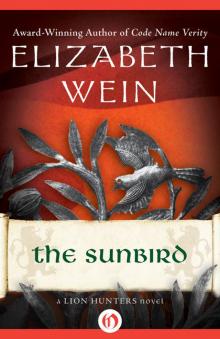- Home
- Elizabeth E. Wein
The Sunbird Page 4
The Sunbird Read online
Page 4
“Why did they have to whip him?”
“He keeps dropping things. He can’t adjust his straps. The best part of the story is that he probably didn’t hear anything anyway, because none of us were paying any attention to the master and his secretary, we were all too busy watching the salt merchant’s little monkeys fighting one another. Who knows, who cares what the master said?”
Plague will raise the price of salt.
The dizzy rush of blood to his head made Telemakos feel as though his face was on fire. The rest of him went cold.
The cat boy said, “For God’s sake, go pester someone else with your horrible questions, you ghoulish little mongrel.”
There was another long, wordless shriek from the maimed porter, and Telemakos and the boy with the moustache both buried their faces again. Telemakos pressed his flaming cheeks against the fur of the beautiful mutilated cat.
Plague will raise the price of salt.
He could not find the strength to lift his head. He sat trembling in the dust at the other boy’s feet, wishing desperately that he was alone in the highland savanna with his father and a herd of bushbuck, instead of waiting among these wretched people while Medraut tortured a hapless servant who was less guilty than Telemakos himself.
“Go on, go away,” snapped the cat boy. “This isn’t a circus.”
Telemakos gathered himself and stood up. He took a deep breath.
“All right,” he said. “I’m sorry about your friend.”
“He’s just a porter,” the boy repeated bitterly, and looked away.
Alone at last again with Medraut, much later, Telemakos walked in silence. Of course, Medraut never said anything anyway, but Telemakos often spoke to him, and sometimes for him, as he had done that morning. Now he could not bring himself to speak a single word, appalled to possess knowledge worth as much as his tongue, or his hands. After a time Telemakos remembered, with renewed horror: I told the bala heg I’d been listening with Anako’s porters. One of them might have said something about it to Anako. It might be my fault they noticed that boy. It might be my fault they—
He shot badly. He hit a gazelle in the rump, and it took him five more arrows to kill it. He could feel Medraut wince with each failed attempt; it always bewildered Medraut that his son could be so inaccurate an archer. After the fifth botched shot, Medraut pulled back the arrow that was notched to his own bowstring. Telemakos spoke then for the first time since they had left the roadside well, snarling at his father, “I don’t need your help!”
It was late evening when they arrived at Grandfather’s country estate, and Telemakos noticed that Medraut gave him much closer attention than he usually did: helped Telemakos with his bath, saw him to his room there, brought him supper of injera bread and wat made from the meat of the gazelle they had caught on their way. Medraut sat with Telemakos while he ate, sharing his food. Then before Medraut left Telemakos alone for the night, he took the boy’s head between his hands, and smoothed his son’s thick white hair back gently from his forehead. He peered into Telemakos’s face, his expression worried and sorrowful. Telemakos lowered his eyes respectfully to avoid meeting his father’s unreadable dark blue gaze, and Medraut took his hands away and nodded a wordless good night.
Telemakos was seized with a sudden piercing hatred of his lost uncle, Lleu the Bright One, who could not know or care whether Medraut ever spoke his name again, who could never need Medraut’s silence as much as Telemakos needed to hear his father’s voice.
IV
DOVES FOR THE POOR
“Light me a fire to purify this house.”
22:519
TELEMAKOS THOUGHT ABOUT THE challenge Goewin had set before him, the emperor’s challenge. He thought about the spearmen who always stood at the door to the emperor’s council chamber. He thought about Anako’s maimed porter. Three months passed. So long as he kept silent, Telemakos was safe.
His mother came to interrupt him in the middle of his Greek reading, a lesson that he turned up for sporadically.
“You have a visitor,” Turunesh said. “Come and attend at once.”
“Who is it? What do you mean?” Telemakos dropped his reading on the floor as he jumped to his feet. He hurried to take his mother’s outstretched hand, leaving his long-suffering tutor sighing elaborately as he picked up the discarded scrolls.
“The emperor invites you to a game of santaraj.”
Telemakos laughed. “Who is it really?”
“The emperor wants to play chess with you,” his mother repeated. “He is waiting for you in your grandfather’s study.”
She was serious. Telemakos felt panic rising in his throat and swallowed it, holding tightly to his mother’s hand as she led him through the house.
“Really play santaraj?” he asked desperately.
“That is what he said,” Turunesh answered. “So we have laid out Grandfather’s best board and the ivory men from Cathay, and I shall come and serve him coffee when you have finished. Ferem will wait on you.”
It was beyond protesting. Telemakos could think of no argument. He felt as though he were being led to execution.
Old Ferem waited outside Kidane’s private office. He nodded to Telemakos and held open the door.
Telemakos stepped into the room and then lay flat on the floor, his face in his arms.
“Lij Telemakos,” Gebre Meskal said, acknowledging him, “Please get up. Sit with me.”
Telemakos obeyed silently. He had no idea what to say.
“I have not seen you in my court of late,” said Gebre Meskal lightly, “or in my council.”
The emperor was even younger than Goewin, barely ten years older than Telemakos. Telemakos could remember him as a beardless youth in the days before his coronation, but even then Gebre Meskal had seemed grave and ancient, his ways mysterious, his thoughts unguessable. His clothes were simple, a white kilt and shamma as plain as those Telemakos wore himself; except the emperor’s shamma was clasped with a great cross embedded with emerald, and his head cloth was woven of gold-shot linen and bound with ribbons of gold mesh.
“Mother has kept me hard at work of late,” Telemakos said; then he felt ashamed not to take responsibility for his own inaction. He added falteringly, “I’ve been neglecting my lessons. I don’t excel at anything; my father deplores my shooting, my mother deplores my Greek.”
“Do not demean yourself. Your aunt and my cartographer both speak highly of your skill with maps. Perhaps you will make a ship’s pilot, or a navigator. Has your father taught you to reckon a path by starlight, when you hunt together?”
“Yes, Your Majesty,” Telemakos stammered, stunned to receive such a compliment from the emperor.
“A good tracker reads the sky as well as the land, and understands the cries of many separate creatures,” Gebre Meskal continued, looking at Telemakos thoughtfully. “You must begin to learn our several tongues. Noba is an excellent language. It comes more easily than Greek to anyone who already has Ethiopic, and the Noba chants are most musical. I shall find you a Noba tutor.”
“Yes. All right,” said Telemakos in surprise. “Thank you, Your Majesty.”
“Come, share a game with me,” said the emperor. “Your grandfather tells me you are a fair player.”
I do not believe I am doing this, Telemakos thought.
He rapidly lost half a dozen contests. He did not expect to win, of course, and would not have known what to do with himself if he had won: what are you supposed to do when the emperor invites you to play a game with him, anyway? Pretend you are an idiot, or do your best to show off your intelligence? Telemakos was a mediocre player at best, he knew. He could trounce his father, but that was because Medraut had never mastered the Aksumite opening, when you and your opponent both moved your men at the same time until a piece was taken.
Telemakos was fast, fast; his strategy was to rush everybody to the front, to push as many players as possible across the board as quickly as possible. Gebre Meskal was slow,
slow. He waited, waited, waited while his young opponent created elaborately complex scenarios, then brought Telemakos’s intrigues crashing down with one or two patient moves. Oh, why am I doing this, Telemakos wondered, watching the emperor solemnly set the pieces up again. Gebre Meskal’s narrow face was impassive; he showed no sign of either disapproval or triumph.
“Lij Telemakos,” he said this time, before they began yet another ridiculous trial, “are you able to play the exact game you played last time?”
“Do you mean, repeat myself? Move the pieces in the same way?”
“Yes.”
Telemakos hesitated. “I think so.”
“Do it.”
So he did, more slowly this time because he knew it was a lost cause.
“Attend,” said Gebre Meskal, and wove one ivory pawn across the board among Telemakos’s men, and took his sovereign.
They both sat silent, bent over the board. Again Telemakos found himself unable to speak.
“What did you see?” the emperor asked.
Not What did you learn, but What did you see?
“I left my king unguarded.”
“Well, that’s so. But that is not what I want you to see. Let’s play this game again.”
“This one game?” It was torment.
“Aye.”
So they did, again. And again Gebre Meskal asked Telemakos, when it was swiftly ended, “What did you see?”
“Your pawn,” Telemakos said slowly. “Your only pawn.”
“Many would say he is the lowliest player on the board,” said Gebre Meskal. “Smaller than any other. Yet he has brought down an army.”
“Alone,” said Telemakos. Gebre Meskal handed him back his king. Telemakos turned the piece over, then sat on his hands to keep them from trembling. “It’s just a game,” he said.
“It can be done,” the emperor said mildly. “Tell your servant I am ready for my coffee.”
Ferem went for Turunesh, and they returned together with all the equipment for a coffee ceremony. Turunesh would not let Telemakos have any, as usual, so he had to remain sitting on his hands, looking at the floor, while the emperor spoke to his mother.
“How have you found the quarantine, Woyzaro Turunesh? Does it affect the noblewomen in the heart of the capital?”
“Not especially,” Turunesh answered. Telemakos noticed that her mild, unhurried manner was similar to Gebre Meskal’s; why then should it be so easy to talk to her, and so impossible to talk to him?
“My father thought to sell his ships, since they may no longer trade on the Red Sea,” Turunesh said. “But we should not see payment until the quarantine is lifted anyway, so we are putting two of the boats in dry dock, and the rest will have to remain at the mercy of their crews. We sent out messages to them, but of course we will not hear back. Possibly our men will find harbor across the sea in Himyar, in your cousin Abreha’s kingdom.”
Her hands moved automatically through the ritual of making coffee, lighting her burner, sorting the seeds for roasting.
“I worry for those men in my father’s employ,” Turunesh finished. “But so do I worry for us all, for Aksum. I doubt that I shall suffer any serious hardship myself.”
“I’m glad,” said Gebre Meskal. “It warms me to know my councilor Blatte Kidane and his daughter are with me. Perhaps you have already heard the news from Deire, where the ban on foreign trade has been taken lightly.”
Deire was Aksum’s most important port after Adulis, White Deire in the far south, beyond the Salt Desert. It was the hub for Aksum’s exported salt.
“What news?” Turunesh asked politely.
“Contaminated goods were allowed in, weeks ago. Pestilence has consumed Deire.” He paused. “Plague has reached Aksum.”
Turunesh set her earthen pot to boil. Then she hid her eyes behind one hand. She said quietly, “I wish this were not true.”
“So do I,” said Gebre Meskal, in tones no less calm or matter-of-fact than anything else he had said. “It is an evil truth. But the quarantine holds. Let me tell you of the ruin of Deire.”
The servant began to tiptoe out, Gebre Meskal said sharply, “Please stay. It is no secret. I should like to hear this news shouted among the hornbills from treetop to treetop.”
The emperor paused. There was no sound but the whisper of flames in the coffee burner.
“Deire is consuming herself,” said Gebre Meskal. “She lies besieged from within, like a burning building that no one can escape, and which no one will enter.
“You know I do not want to damage my alliance with Abreha in Himyar. My admiral makes a monthly trip to the Turtle or the Hanish Islands, where he moors alongside Himyar’s flagship and exchanges news with the Himyarites. But we have been cautious not to come near each other in the meetings, and no ship may return to Aksum unless under my naval escort. Other ships may leave Aksum, at any time, with appropriate authorization. They may leave, but they may not return.
“Someone has been counterfeiting my authorization, and ships have been allowed to return to Deire. Plague has come with them.”
Telemakos held quiet, listening. He sat straight and polite at first, his eyes on the floor, not even daring to watch his mother make the coffee; but then as he became absorbed in Gebre Meskal’s story he began to watch the butler, Ferem, who had squatted on his heels by the doorway when the emperor commanded him to stay. The old man became more and more bent as the tale went on, until he leaned with his elbows against his knees and his face hidden in his hands. He rocked back and forth on his heels, making a low, keening noise, as though in mourning.
“So we have sent a squadron of the armada to close the port, and soldiers to set a cordon around the city. Deire is guarded by a ring of fire and steel ten miles across. No one shall escape.”
“They will all die, then,” Turunesh said simply. She filled a cup of steaming coffee and set it before the emperor, and Telemakos marveled at the steadiness of her hands.
“We do not want to starve them. We do not want to murder them. They may no longer fish; their port is closed. We deliver tef to their boundaries, milled and ground for baking injera, and we leave it for them. We leave them beer and honey wine, goats and hens, herbs for medication. But they must build their own pyres and dig their own graves.
“No one may leave Deire. A few try; and they are struck down from a distance by the trained spears of my soldiers, and the bodies are set alight with flaming arrows. Nothing shall leave Deire. Deire is lost, that Aksum may be saved.
“Do you excuse me, lady,” the emperor finished, and suddenly sank his head in his hands, like the butler. Telemakos glanced upward for a moment and saw the emperor’s face wet with tears.
“Deire is lost,” Gebre Meskal repeated. “It is as though I have cut off my hand to save my body from infection. I weep for Deire, White Deire of the south.”
Telemakos thought of Anako, Deire’s heartless and greedy archon. It seemed perfect justice that he should perish in pestilence. But what of all his company, the hapless porter Butala, the haughty young animal keeper and his black caracal, the rest of them? Plague would not pick and choose the good from the bad; there was no justice in plague, neither good nor evil. Plague was inhuman.
Gebre Meskal turned to the weeping Ferem. “Go, you may go.” The old man crept out quietly. Gebre Meskal continued to speak to Telemakos’s mother:
“If Deire is destroyed, I fear for Adulis, my second city, the glittering port of black basalt. Who subverted my rule in the south will sensibly move north. Perhaps the sacrifice of Deire may instruct the traitors; but I, too, have learned from this. I shall watch Adulis with care and with secrecy, from without and from within.”
Then the emperor asked Turunesh a strange question.
“Tell me, Woyzaro Turunesh, would you be afraid to visit your uncle Abbas, the archon in Adulis, knowing there might be risk of plague there through practice of a black market in white salt?”
“Your Majesty—” Turunesh hesitat
ed. “Majesty, I don’t think it would worry me. If Adulis fell to plague, Aksum herself would not be far behind. There would be no escaping it. We have all the Great Valley and the Salt Desert between us and Deire, but Adulis is our sister city.”
“I think so too. I’m glad you are so fearless,” said the emperor. “Perhaps one day soon Lij Telemakos will want to see Adulis.”
“What if…” Telemakos asked his mother, “what if someone asked you to do something, something important and exciting, and you did not want to do it?”
“What are you up to?” she asked.
“Not a thing.”
“Ah, not a thing.” Turunesh sighed. “Good. I’m glad. Help me with this one.” They were caging white doves in a big basket, three dozen of their own pet doves, as alms to the Cathedral of St. Mary of Zion. This was the first time the quarantine had affected Telemakos personally: he had to sacrifice his doves so that Aksum’s less fortunate might make sin offerings of them. Telemakos was sorry to see them go. But he was much better at catching the doves than his mother, so he had to help pack them. It felt like a cruel betrayal, coaxing his pets from their niche homes in the sunlit wall of the courtyard, stroking their downy breasts to gentle them still, then letting his mother truss their wings so they could not escape as she laid them in the hamper, ready for some devout sinner to wring their necks and drain their blood.
“Why must we give these away?” Telemakos asked. “Why not buy some more at market and make a donation of them?”
“They don’t earn their keep. I can’t justify feeding grain to fat and lazy birds, when Gedar in the villa across the way is having to sell his horses to buy tef flour. If the quarantine goes on a year or two, he will end by selling his house.”
“Will we have to sell our horses? Or our house?”
“I doubt it. We don’t depend on olive oil from Himyar to pay for our food, like Gedar. We can move to the estate in Adwa, and grow our own tef, if need be.”
“Then why do the doves have to go, if we can afford to keep them?” Telemakos persisted.

 The Pearl Thief
The Pearl Thief Cobalt Squadron
Cobalt Squadron The Empty Kingdom
The Empty Kingdom Code Name Verity
Code Name Verity Rose Under Fire
Rose Under Fire A Coalition of Lions
A Coalition of Lions Black Dove, White Raven
Black Dove, White Raven The Winter Prince
The Winter Prince The Sunbird
The Sunbird